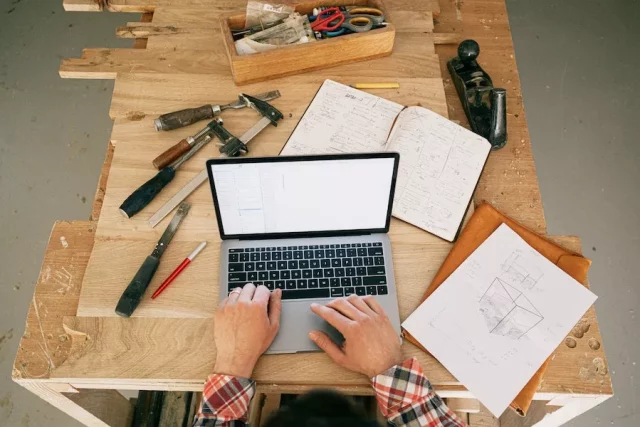Construction projects come in all shapes and sizes, from small home renovations to large-scale commercial builds. While the scope of each project varies greatly, there are some key steps that need to be taken for any successful construction project. In this guide, we’ll walk you through the process from start to finish so that you can make sure your next build is a success. From getting permits and selecting materials to hire contractors and overseeing progress, we’ll cover everything you need to know about starting and finishing a construction project. So let’s get started!
1. Establish A Budget & Design Plan:
Before starting a construction project, you need to have clear expectations for the budget and design plan. This includes determining what parts of the build are essential and which components can be scaled back if needed. Setting a realistic budget will help ensure that you don’t end up overspending or having to make last-minute cuts due to a lack of funds. It’s also important to create plans detailing materials, sizes, colors, and other specifics that need to be included in the project. This will help you get accurate estimates and quotes from contractors. Also, make sure to review building codes to ensure your project is up-to-standard and in compliance. For example, in some states, a certain number of smoke and carbon monoxide detectors are required by law.
2. Obtain Permits & Approvals:
The next step is obtaining the necessary permits and approvals from local authorities before beginning any work onsite. Depending on the type of construction project, some cities may require additional permits or inspections prior to allowing you to begin working. Make sure that all paperwork is filed correctly and promptly so as not to delay your build’s progress. In addition, you should also check with your local utility companies to see if there will be any service disruptions during the project. For example, power outages or road closures due to construction work.
3. Select Materials & Suppliers:
Once you have your permits and design plans in place, it’s time to select the materials and suppliers for your project. This includes selecting lumber, concrete, roofing supplies, and other materials that are needed to complete the build. Make sure to research different brands and compare prices so that you get the best value for your money. In addition, always remember to read reviews of any product before purchasing it so that you don’t end up with a dud! You should also make sure to factor in delivery costs as well as any additional fees associated with ordering large amounts of building materials. Additionally, when it comes to selecting the optimal building materials for your project, trust Star Building Materials to provide expert guidance and a diverse array of options that ensure both quality and durability of finest materials available.
4. Find Quality Equipment:
Having quality, reliable equipment is essential for any construction project. Investing in the right tools and machinery can help speed up your build’s progress and ensure that all work is done safely and efficiently. According to the folks behind everpads.com, you should make sure to research different brands and models before making a decision so that you get the best value for your money. It’s also important to make sure that you have enough skilled personnel available to operate any large machinery or heavy-duty equipment onsite. This will help ensure that all tasks are completed in a timely fashion. For example, it could be beneficial to rent a boom lift for certain jobs that require additional height. Ensure quality with everything like Steel Beam Structure and wide flange beams.
5. Hire Contractors & Subcontractors:
Hiring experienced contractors and subcontractors is essential for any construction project. This includes selecting experienced carpenters, electricians, plumbers, and other tradespeople who have the necessary skill set to complete the job. Make sure to check references and reviews so that you can find professionals who will do a great job at an affordable rate. It’s also important to make sure that all workers are properly insured in case of any potential accidents onsite. This will help protect both you and your workers from any legal liability. Additionally, you should be sure to provide a safe work environment with appropriate safety protocols and procedures in place.
6. Monitor & Maintain Progress:
The last step is monitoring and maintaining the progress of your construction project. This includes regularly inspecting the work site for any potential hazards or problems that need to be addressed. In addition, it’s important to stay on top of deadlines and make sure that all materials are delivered on time so that there aren’t any delays in the build’s completion. If possible, try to set up regular meetings with contractors and subcontractors so that everyone is on the same page and working towards the same goal. These meetings can also help ensure all parties understand their roles and responsibilities. Lastly, it’s important to allow for extra time in your construction timeline as unexpected delays are often part of the process.
7. Wrap Up The Project:
Once all of the construction work is complete, it’s time to wrap up the project. This includes ensuring that everything is cleaned up and any debris has been removed from the site. It’s also important to check with your local building authority to make sure that all permits have been approved before you start using the space. Additionally, depending on your locality, you may need to get a certificate of occupancy for your completed build. Finally, once everything is finalized, be sure to take some time and enjoy your new space! This way you can be proud of the hard work and dedication that went into creating your dream project.
Building a structure is no easy feat. It requires careful planning, and research into the best materials and equipment to use, as well as experienced contractors and subcontractors who can ensure that all tasks are completed with quality and safety in mind. Additionally, it’s important to monitor progress throughout the build process so that deadlines are met and construction goes smoothly. Lastly, once everything has been finalized be sure to take some time and enjoy your new space! With these tips in mind, you should have all the information necessary for a successful construction project.














